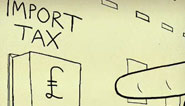Find out about The Open University's Economics courses.
David Mitchell is waiting to explain six key economic concepts in sixty seconds apiece. Which is pretty economical in itself, if you think about it...
Transcript: An economy is a tricky thing to control, and governments are always trying to figure out how to do it.
Back in 1776 economist Adam Smith shocked everyone by saying that what governments should actually do is just leave people alone to buy and sell freely among themselves.
He suggested that if they just leave self-interested traders to compete with one another, markets are guided to positive outcomes 'as if by an invisible hand'.
If someone charges less than you - customers will buy from them instead – so you have to lower the price or offer something better.
Wherever enough people demand something, they will be supplied by the market – like spoilt children – only in this case, everyoneʼs happy.
Later free-marketeers like Austrian economist Friedrich Hayek, argued that this ʻhands offʼ approach actually works better than any kind of central plan.
But the problem is, economies can take a long time to reach their ʻequilibriumʼ, and may even stall along the way. And in the meantime people can get a little frustrated, which is why governments usually end up taking things into their own more visible hands instead.
Got another 60 seconds?
-
60 second adventures in economics: The Paradox Of Thrift
Watch now to access more details of 60 second adventures in economics: The Paradox Of ThriftIs it better to save or to spend? According to Keynes, if you don't spend, you're going to make the economy even worse. This animations explains more in just one-minute.

Video
Level: 1 Introductory
-
60 second adventures in economics: The Phillips Curve
Watch now to access more details of 60 second adventures in economics: The Phillips CurveBob Phillips took some time out of crocodile hunting to have a stab at explaining how wages, prices and unemployment interplay.

Video
Level: 1 Introductory
-
60 second adventures in economics: The Principle Of Comparative Advantage
Watch now to access more details of 60 second adventures in economics: The Principle Of Comparative AdvantageWhy do countries sign free trade agreements? It's not just because they get to keep the pens, but to try to take advantage of their comparative advantage.

Video
Level: 1 Introductory
-
60 second adventures in economics: The Impossible Trinity
Watch now to access more details of 60 second adventures in economics: The Impossible TrinityNations want it all - currency flows, low interest rates and stable exchange rates. Dream on, nations, you've got to choose.

Video
Level: 1 Introductory
-
60 second adventures in economics: Rational Choice Theory
Watch now to access more details of 60 second adventures in economics: Rational Choice TheoryPeople are pretty rational. But not quite rational enough for the good of the economy.

Video
Level: 1 Introductory
Got more than 60 seconds? Try these...
-
Economics and the 2008 crisis: a Keynesian view
Learn more to access more details of Economics and the 2008 crisis: a Keynesian viewThis free course, Economics and the 2008 crisis: a Keynesian view, looks at how Keynes's theories revolutionised thinking about the causes of crises and unemployment. Keynes's thinking on how to reduce these problems was very influential with economists and policy makers for several decades following the 1930s. The economic downturn that started...

Free course
28 hours
Level: 2 Intermediate
-
Economics explains discrimination in the labour market
Learn more to access more details of Economics explains discrimination in the labour marketDiscrimination in the labour market exists in many forms: the 'glass ceiling', ageism, racism, and so on. This free course, Economics explains discrimination in the labour market, will help you look at this problem from a new perspective: through economics. You will learn how economists have tried to understand what drives this distortion of the...

Free course
8 hours
Level: 3 Advanced
-
Rent or buy? The challenge of access to housing
Learn more to access more details of Rent or buy? The challenge of access to housingEveryone needs a place they call home and housing costs are usually your largest outgoing. Many aspire to buy, but rising house prices, while good news for existing owners, put homeownership beyond the reach of others. This free course, Rent or buy? The challenge of access to housing, addresses some of the most important decisions that ...

Free course
8 hours
Level: 1 Introductory
Rate and Review
Rate this video
Review this video
Log into OpenLearn to leave reviews and join in the conversation.
Video reviews